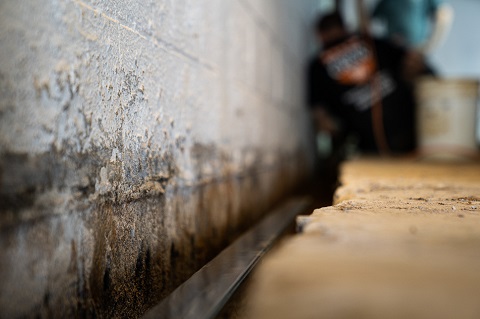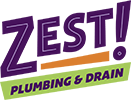Cracks in walls, shifting soil, and water damage are all visual clues that could indicate you have a slab leak in your business or home. Recognizing the warning signs and acting promptly by contacting a plumbing professional are essential steps in mitigating slab leak damage. Learn more about the factors that increase the potential for slab leaks to develop, what could happen if you ignore a slab leak, and slab leak repair costs and options.
What Is a Slab Leak?
A slab leak occurs in water pipes running underneath a building’s foundation. Slab leaks that don’t receive prompt repair can compromise your home’s structural integrity, including its floors, foundation, and walls.
What Signs Should You Look for to Help You Identify a Slab Leak?

While officially diagnosing a slab leak requires a plumbing professional like Zest Plumbing, you can look for specific indicators that point to a possible slab leak, such as:
- Cracks in your home’s foundation walls.
- Flooring that feels warm to the touch.
- Shifting soil outside the building.
- Standing water or water damage to floors.
- The sounds of running water inside your home when you’re not using any appliances.
- Uneven growth in lawn or foundation plants.
If you discover one or more of these problems in your business or home, contact Zest Plumbing promptly.
What Factors Could Increase the Chances of Your Home Developing a Slab Leak?
While slab leaks can occur in both new and old homes, certain conditions can predispose buildings to develop a slab leak.
Highly Acidic Water
High levels of acid in water can degrade water pipes over time. This degradation is particularly noticeable with copper pipes, which will have a light-blue or light-green color in corroded areas.
To prevent slab leaks caused by acidic water, have water-testing professionals analyze your water and recommend an appropriate water-softening product.
Abrasion Caused by Shifting Earth
Some soils contain minerals that expand when they come into contact with water. This expansion can cause underground pipes to rub against the building’s foundations or abrasive materials in the soil itself. Over time, this friction can cause pipes to develop leaks.
Ground movement caused by seismic activity can also cause soils to shift and damage to underground pipes.
Extremely High Water Pressure
Very high water pressure in your home can take its toll on plumbing fixtures over time. The continued force of the water on the pipes can cause them to rupture or collapse, resulting in a slab leak. Addressing problems with high water pressure can protect your pipes from leaks and ruptures.
Gradual Degradation of Pipe Materials
Over time, the interactions between the minerals in the soil and those in underground plumbing pipes can begin to degrade the pipes, resulting in a potential slab leak. Copper, galvanized steel, cast iron, and plastic are all subject to wear and tear over time, making them more vulnerable to developing leaks.
What Could Happen If You Ignore a Slab Leak?
Ignoring a slab leak can result in significant problems for your home and health. The following are some of the many issues that could result if you delay fixing a slab leak.
Damage to Your Yard
Flooding in your yard that results from a slab leak can damage pools, landscaping, brick or concrete walkways, and other paths through your garden.
Health Issues
When a slab leak introduces water into your home, drywall and wood can absorb this moisture, creating a favorable environment for mold growth inside your walls. When mold spores circulate inside your home, you or your family could experience watery eyes, runny noses, coughing, headaches, and fatigue from inhaling them. Mold can also cause musty odors that can compromise your home’s indoor air quality.
Long-Term Damage to Floors
The primary indicator of a slab leak is a domed or raised area in your floor. If left untreated, a slab leak can permanently damage your flooring due to excessive water pooling.
Structural Problems
Slab leaks can affect your home’s structural integrity, causing shifts, cracks, or the collapse of concrete and steel supports. Repairs to correct problems with your home’s foundations and related structural supports can quickly become expensive if you allow a slab leak to go unresolved.
What Are Your Options for Repairing a Slab Leak?
Promptly repairing a slab leak is essential to prevent substantial damage to your home or business. Specialized inspection tools, such as cameras used for sewer inspections, can help identify the source of a leak.
Sealing With Epoxy
Repairs for smaller, localized leaks involve pouring epoxy into the water line. The substance seals the leak by coating and strengthening the surrounding pipes, a less disruptive and more affordable solution to a slab leak repair than jackhammering through a concrete slab to access the pipes.
Cast-In-Place Piping
Another method for repairing a slab leak is cast-in-place piping. This process involves cleaning and extricating debris from the pipe and directing a flexible, epoxy-coated lining through the length of the line. The epoxy layer hardens between the lining and the pipe wall, forming a sealed plumbing line within the line.
Repiping or Rerouting
Some older homes or businesses may require repiping or rerouting to correct slab leaks, a process that redirects pipes around the outside edge of the slab. Repiping ensures new plumbing installations are accessible for future inspection and servicing.
Contact Zest Plumbing and Drain for Professional Slab Leak Repairs
Recognizing the signs of a slab leak and promptly correcting the problem is essential to protecting your business or home from further damage. Our Zest Plumbing and Drain team is a premier service provider of slab leak detection, plumbing repair, and plumbing inspection and servicing. Zest Plumbing and Drain serves Paradise Valley, Phoenix, Scottsdale, and Tempe, among other areas. We stand by our licensed, factory-trained personnel and deliver a professional service. Call us at 480-448-5750 or email us to schedule a plumbing inspection.
